 1.
1. The son of Civil Service Permanent Secretary Sir Richard Clarke, Charles Rodway Clarke was born in London on Thursday, 21 September 1950.

 1.
1. The son of Civil Service Permanent Secretary Sir Richard Clarke, Charles Rodway Clarke was born in London on Thursday, 21 September 1950.
Charles Clarke attended the fee-paying Highgate School where he was Head Boy.
Charles Clarke then studied Mathematics and Economics at King's College, Cambridge, where he served as the president of the Cambridge Students' Union.
Charles Clarke had joined the Labour Party by then and was active in the Clause Four group.
Charles Clarke was the British representative on the Permanent Commission for the World Youth Festival from 1977 to 1978.
Charles Clarke was elected as a local councillor in the London Borough of Hackney, being chair of its Housing Committee and vice chair of economic development from 1980 to 1986.
Charles Clarke worked as a researcher, and later chief of staff, for Labour Party leader Neil Kinnock from February 1981 to 1992.
Charles Clarke was Kinnock's chief of staff from 1985 onwards.
Charles Clarke moved to the Home Office in 1999, and joined the Cabinet as Minister without Portfolio and Party Chair following the 2001 general election.
Charles Clarke returned to Education as Secretary of State on 24 October 2002, after the resignation of Estelle Morris.
Charles Clarke oversaw the introduction of Bills to enable universities in parts of Britain to charge top-up fees, despite a Labour manifesto commitment that it would not introduce such fees and indeed had 'legislated to prevent them'.
Charles Clarke was swiftly at the centre of attention for his advocacy of proposals for countering terrorism.
Charles Clarke was criticised for the Identity Cards Act 2006, seen by some as serious infringement of privacy, but Clarke insisted that identity cards were necessary to combat terrorism.
In 2006, Charles Clarke scrapped an ex-gratia discretionary scheme under which compensation to those wrongly convicted of a criminal offence could be awarded.
Former Home Secretary David Blunkett supported Charles Clarke but said that "heads should roll" over the scandal, though many of the releases had occurred during his period as Home Secretary.
However, in the wake of a poor Labour performance in the local council elections of 4 May 2006, Charles Clarke was dismissed in a cabinet reshuffle, labelled biggest cabinet upheaval in the history of the Blair governments, and was replaced by Defence Secretary John Reid.
In September 2006, Charles Clarke took up a consultancy post with a leading London law firm, leading to speculation he anticipated not returning to frontline politics.
On 8 September 2006, Charles Clarke gave an interview to the Evening Standard in which he criticised the 'presumption' that Gordon Brown would succeed Tony Blair as prime minister, helping trigger further disputes about the Labour leadership.
On 23 March 2008, Charles Clarke published a list of 35 Labour held constituencies vulnerable to other parties if fewer than 7,500 voters switched parties away from Labour.
On 4 September 2008, Charles Clarke attacked Gordon Brown's performance as leader of the Labour Party and prime minister, claiming that he only had "months" to improve or else should face a leadership contest.
On 1 May 2009, Charles Clarke joined David Blunkett in criticising Gordon Brown's leadership and declared that he was "ashamed" to be a Labour MP, citing the Damian McBride scandal.
In September 2009, Charles Clarke gave a speech in which he said that Brown should stand down as prime minister to help the Labour Party avoid "a hammering" at the 2010 General Election.
Charles Clarke lost his Parliamentary seat in the 2010 General Election by a margin of just 300 votes, and declared he was unlikely to stand again for Parliament.
On 20 September 2010, it was announced that Charles Clarke had been appointed Visiting Professor to the School of Political, Social and International Studies at the University of East Anglia.
Since November 2010, Charles Clarke has been Visiting Professor of Politics and Faith in the Department of Politics, Philosophy and Religion at Lancaster University.
Charles Clarke is a Council Member of the European Council on Foreign Relations.
Charles Clarke is a Senior Network Member at the European Leadership Network.
Charles Clarke originally expounded his ideas in a series of lectures at the University of East Anglia in 2011.
Charles Clarke married Carol Pearson, granddaughter of August Maramaa in Hackney, London, in 1984.
Charles Clarke speaks Cuban Spanish, French, and German.
Charles Clarke is an avid supporter of Norwich City Football Club.